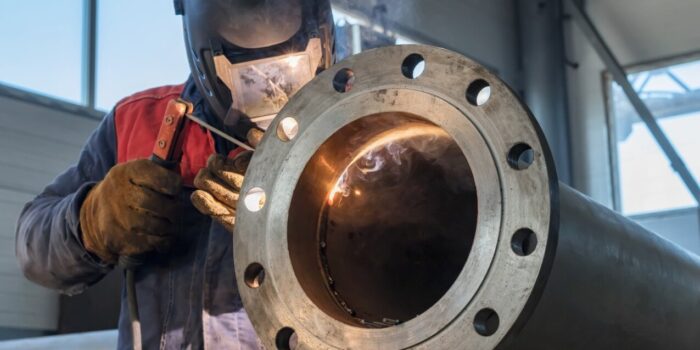Flange fitter - qualification training
Due to current legislation and the requirements of the European Pressure Directive, a special qualification backed by a certificate is required for the installation of flanged joints. Our company has met the interest and developed certified courses for fitters of flanged joints of pressure equipment in accordance with the latest regulations.
Requirements for candidates
Flange fitting training can be started by anyone regardless of their experience or professional situation. The only requirements we place on participants are:
- completion of the 18th year,
- at least primary education,
- no medical contraindications to the occupation (examination with an occupational physician required prior to taking the course).
Why choose our training?

We have many years of experience in providing training and courses. Our instructors are true professionals in their fields and people with passion and commitment, always there to offer help and good advice. During classes, our trainers apply an individual approach to each course participant. We strive to meet the expectations of our customers, which is why we are constantly improving and refining our services and ensuring that our training prices are competitive.
Topics covered in the flange fitter course
During the training we cover topics such as:
- types of flange and bolt connections,
- functions, types and properties of seals,
- differences between bolt elongation, clamping force and gasket pressure,
- effects of bolt relaxation,
- safe disassembly,
- how to prepare the rebate surface and how to store, handle and prepare the gasket,
- installation methods and bolt torque calculations,
- tightness classes.
Examination and TÜV certificate
The course consists of a theoretical and a practical part. After the training, the trainee takes an exam and, upon successfully passing both parts, is awarded a TÜV certificate. The certificate is recognised in Poland and the EU and is valid for 5 years.
Place of training
We organise training courses according to a schedule in the locations we specify throughout the country, including Gdańsk, Szczecin, Warsaw, Kraków, Wrocław, Poznań, Kielce or Bydgoszcz. We can also conduct courses at the client's facility in the case of closed-door training.
We offer attractive prices, extensive training programmes and travel to the client.
Other services we offer

We also offer stationary and mobile service, including: scissor lifts, telehandlers, cranes, forklifts, HDS cranes and aerial work platforms.
We also offer training for maintainers and operators of: scissor lifts, telehandlers, cranes, forklifts, HDS cranes, aerial work platforms, tower cranes and cranes.
If you are interested in purchasing a new or used machine, please contact us. We will be happy to advise you on the best machine to meet your requirements.
If you are interested and have any questions, please do not hesitate to contact us. We will dispel all your doubts.
We also encourage you to take a look at the rest of our offer.
Questions and answers
What does the trainee receive on completion of the training?
Upon completion of the training course and passing the examination, the trainee is awarded a TÜV certificate, allowing them to practice their profession. The qualification is valid for 5 years and entitles you to work in Poland and EU countries.
What topics are covered during flange fitter training?
The training course discusses the various types of flange bolt connections, the functions, types and properties of gaskets, the differences between bolt elongation, clamping force and gasket pressure, the effects of bolt relaxation, installation methods and bolt torque calculations, leakage classes.
What are flange connections?
These are two opposing flanges of steel connected to each other by a minimum of four screws. Tightness is ensured by rubber placed between them. The flanges are welded to the ends of the pipes, allowing them to be joined and the direction of the pipeline to be changed. Flanged joints are used, for example, on water pipes, sewer lines, gas pipes and heat pumps.


